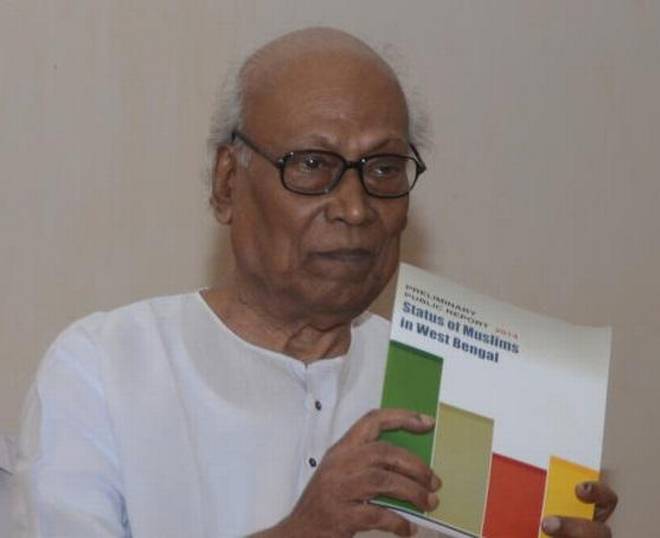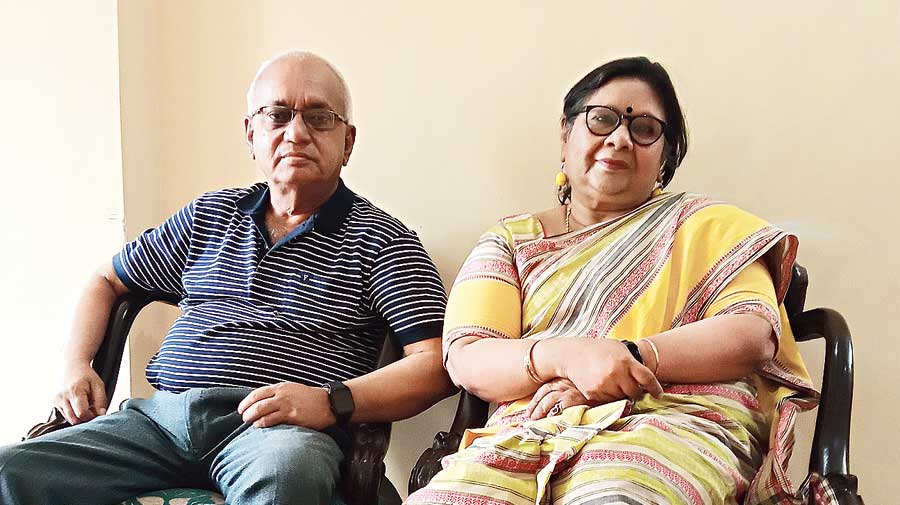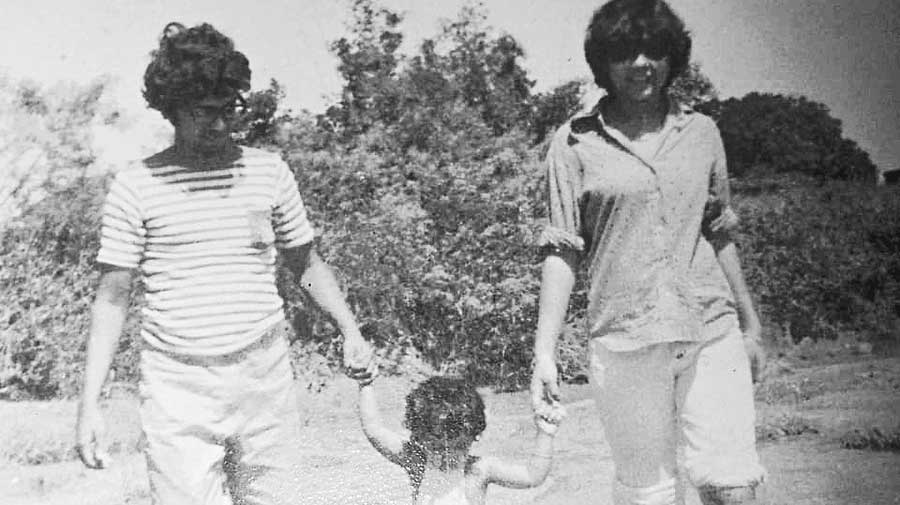Monthly Archives: April 2021
23
22
Poet Sankha Ghosh passes away at 89

He had tested positive for COVID-19 earlier in April
Eminent poet and critic Sankha Ghosh passed away in Kolkata on Wednesday. The Jnanpith awardee was 89 and had tested positive for COVID-19 earlier in April.
He was under home isolation for the past few days, but his condition deteriorated late on Tuesday. He is survived by wife and two daughters.
Ghosh was one of most important names in Bengali poetry and, together with Shakti Chattopadhyay, Alokeranjan Dasgupta and Sunil Gangopadhyay, was said to have carried on the baton from the poets of the early part of the 20th century, such as Jibanananda Das and Buddhadev Basu.
He was awarded the Jnanpith Award in 2016 and the Padma Bhushan in 2011. In the shadow of the Rabindranath Tagore era, poets such as Ghosh took the legacy forward.
Considered an authority on Tagore, Ghosh was awarded the Sahitya Akademi Award in 1977 for his poetry collection Babarer Prarthana.
He was born on February 6, 1932, in Chandpur, which is in present-day Bangladesh. The poet graduated in Bengali honours from Presidency College in 1951 and did his post-graduation at University of Calcutta.
He taught at a number of educational institutes, including Visva Bharati University, Delhi University and Jadavpur University. He retired from Jadavpur University in 1992.
Silent protester
Ghosh was a man of few words. Though he was considered one of the greatest of poets, he chose silence even when protesting against the violence and violation of human rights towards the end of the Left Front regime. At the most, he would issue written statements.
The poet had also expressed strong opposition to the Citizenship (Amendment) Act through a poem called Mati. His other well-known poems are Andolan, Mukh Dheke Jaye Biggapone, Chup Koro and Bohiragoto.
“Following the demise of Sankha Ghosh, we extend our deep condolences. I have directed the Chief Secretary and final rites will be performed with full State honours,” West Bengal Chief Minister Mamata Banerjee said.
Ms. Banerjee also added that since the poet was not in favour of a “gun salute,” it would not be part of the ceremony.
Noted Bengali poet Joy Goswami said Ghosh was the conscience of Bengali society. “The Bengali literary circle will feel a void created by his death more and more.”
Writer Sirshendu Mukhopadhyay, recalling his decades-long association with the poet, said that despite several awards and laurels “there was not even a hint of pride in him”.
source: http://www.thehindu.com / The Hindu / Home> News> Cities> Kolkata / by Shiv Sahay Singh / Kolkata – April 21st, 2021
Gautam Sengupta and Yasmeen Sengupta talk about the inclusive Bengal where they lived and loved
At a time when politics of hate threatens to tear apart the inclusive social fabric of the state, such stories demand a telling.

Gautam Sengupta is 69. Yasmeen Sengupta is 65. He is a Hindu. She is a Muslim. Married for 46 years, the two have lived through many ups and downs. Their families have always stood by them.
Till their health permitted, Yasmeen used to paint alpona during Saraswati Puja at her in-laws’ ancestral home in Park Circus every year and Sengupta broke bread with her during Ramazan.
There are many like the Senguptas of Park Circus around Bengal. But such stories demand a telling because of the politics of polarisation that threatens to tear apart the inclusive social fabric of Bengal.

Jesuit culture, Tagore
Yasmeen’s family shifted from Ballygunge Place to Circus Row when she was nine years old. Sengupta’s family home stood a stone’s throw from the Park Circus Seven-Point intersection. The two got introduced through a set of common friends and got married in 1975.
Sengupta, who did his school and college from St. Xavier’s, holds Jesuit principles close to his heart till this day.
Yasmeen did her school from South Point and graduated from Loreto College. Yasmeen’s grandfather, Rafiuddin Ahmed, is the founder of the R. Ahmed Dental College, the oldest such institute in Southeast Asia.
But her inspiration is her grandmother Ayesha Ahmed, an alumnus of Brahmo Balika Shikshalaya. Later, Ayesha was part of a group of women who started a school for girls from marginalised families in Beleghata, which is now called the A.I.W.C Buniadi Bidyapith Girls School.
She made Rabindranath Tagore a part of the lives of the Ahmed family.
Yasmeen and Sengupta got married in Brahmo tradition. “There was hardly any ritual. I remember my friends singing Tagore songs,” said Yasmeen.
“When we were growing up, inclusiveness was not just a textbook word. It was a part of our everyday lives. Every home had pictures of Tagore, Gandhi, Vivekananda and Netaji,” she said.
Sengupta remembered growing up in a neighbourhood where the president of the local Durga Puja committee was a Muslim and the treasurer a Christian.
Sengupta, who runs a manpower consultancy firm, has turned a part of his ancestral home into a guesthouse. The couple also own a flat in the Hastings area and keep shuffling between Hastings and Park Circus.
‘Heroic’ acceptance
One of Sengupta’s grand-uncles (father’s uncle), a doctor, was killed during the 1947 riots. “A man disguised as a woman in a burqa entered his chamber as a patient and shot him point blank,” said Sengupta.
But the past never came in the way of the Sengupta family embracing their daughter-in-law. “My family members always considered the incident an act of terror, an aberration in a moment of madness,” he told this newspaper.
“Their acceptance of me has been absolutely heroic. We (her parents and in-laws) speak the same language, eat similar food. It is not like I was wedded into an alien culture. But the way they rose above petty human instincts was heroic,” said Yasmeen.
The couple have a daughter and a son. Their daughter, Rohini, is married to a Muslim man. The two are settled in Sydney. The bride and the groom’s family had known each other for three generations and the couple knew each other from childhood.
“The marriage happened in 2001. It was such a happy occasion,” Sengupta said. His no-fuss demeanour drove a point home. That some of the stereotypes associated with interfaith marriages are based more on myths than reality. That an interfaith marriage can still be a normal and spontaneous affair.
Yasmeen, a social worker, keeps reading newspaper reports and seeing television programmes around “love jihad” — a Right-wing narrative of Muslim men marrying Hindu girls with the alleged intention of converting and radicalising them.
At least two BJP-ruled states have introduced legislation criminalising interfaith marriages if conducted for the ostensible purpose of religious conversion.
“Where is the individual freedom, guaranteed by the Constitution? This is a blatant violation of constitutional values. Not only is this bad in principle, it is also bad in law,” said Yasmeen.
Fear of tomorrow
“I am terrified of the future,” Yasmeen told this reporter bluntly. She is worried because she has heard plenty of stories of Partition from her elders and she dreads a rerun.
“Politics now thrives on polarisation, more so in the run-up to the elections. Bengal and Punjab are two states scarred by Partition. Both places have seen how polarisation brings out the basest instincts in people. I have grown up around people who saw best friends baying for each other’s blood during Partition,” she said.
Sengupta has spotted a change in the social fabric of Bengal. “A section of people now asserts their religious identity more strongly than before. Wearing your religion on your sleeve is the norm,” he said.
The next second, he gave a caveat. “I have never been too religious. Perhaps that’s why I notice these things more than others.”
Sengupta remembers some “flare-ups” in his neighbourhood in the aftermath of the Babri Masjid demolition in 1992 and surrounding author Taslima Nasreen, who was eventually “expelled” from Bengal in 2007.
Sengupta stood up to a mob with sticks and flaming torches intent on setting a series of taxis on fire. “I managed to prevail on them. They were fuming but went back. Most of them were local boys,” he recounted.
Both the husband and wife said the ongoing polls are more than a battle for political power. “We don’t know if it is possible to get back the Bengal where we got married. But we still have a place where all kinds of people live together. We must try to preserve what we have,” Sengupta said.
source: http://www.telegraphindia.com / The Telegraph Online / Home> West Bengal / by Debraj Mitra, Calcutta / April 19th, 2021